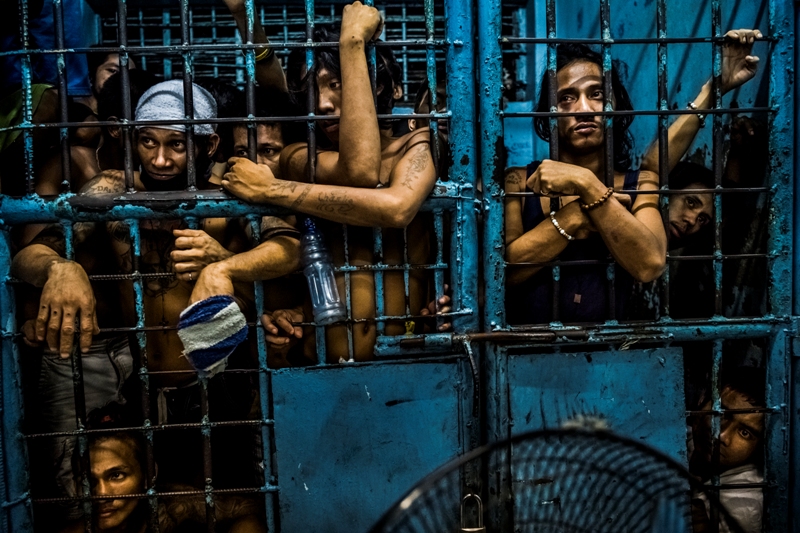Duterte's first year a 'human rights calamity,' HRW says

In this image released Monday Feb. 13, 2017, by World Press Photo titled "They Are Slaughtering Us Like Animals" by photographer Daniel Berehulak for The New York Times, which won first prize in the General News, Stories, category of the World Press Photo contest shows inmates watching as drug suspects are processed inside a police station in Manila, Philippines. Daniel Berehulak for The New York Times/World Press Photo via AP, File
MANILA, Philippines — President Rodrigo Duterte unleashed a “human rights” calamity on the Philippines as he spearheaded a brutal campaign to eradicate illicit drugs, a human rights watchdog said, accusing him of “supporting” drug-related killings and intimidating critics.
In a statement, Human Rights Watch said the Philippine government’s bloody drug war, drug-related overcrowding of penitentiaries and harassment and prosecution of war on drugs critics had caused a “steep decline” in the respect for human rights in the country since Duterte’s ascension to the presidency last year.
Duterte’s office has yet to respond to the latest trenchant statement from the watch group.
Phelim Kine, deputy Asia director of HRW, accused the chief executive of “instigating an unlawful killing campaign” during his first year.
He said that Duterte, who assumed the presidency on June 30 last year, “has supported and incited ‘drug war’ killings’” and retaliated against those who dared to criticize him.
READ: UN official seeks protection for Callamard amid threats
“President Duterte took office promising to protect human rights, but has instead spent his first year in office as a boisterous instigator for an unlawful killing campaign,” Kine said. “Duterte has supported and incited ‘drug war’ killings while retaliating against those fearless enough to challenge his assault on human rights.”
In March this year, HRW released a 117-page report titled, “License to Kill: Philippine Police Killings in Duterte’s War on Drugs,” in which the group accused Duterte, who last year ran on a strong anti-drugs and anti-crime platform, of inciting the killings of mostly urban poor Filipinos.
READ: Report: Patterns in drug killings suggest planning, police involvement
It said that Duterte’s past statements encouraging the killing of drug suspects could be considered “criminal incitement,” adding that the president and senior government officials could be held liable for crimes against humanity.
“No evidence thus far shows that Duterte planned or ordered specific extrajudicial killings, but his repeated calls for killings as part of his anti-drug campaign could constitute acts instigating law enforcement to commit murder. His statements encouraging the general population to commit vigilante violence against suspected drug users could be criminal incitement,” the report said.
It also claimed that rogue officers and vigilante groups were not operating separately from law authorities. It criticized the Philippine National Police for claiming self-defense in carrying out extrajudicial killings.
According to the HRW, security forces and “unidentified gunmen” had killed at least 7,000 drug users and dealers since July 1, including 3,116 killings done by the police.
However, authorities disputed this figure, saying that 2,679 drug suspects had been killed from July 1 last year to January 30 this year. The police said that an additional 1,847 deaths from July 1 to March 31 were drug-related but not a result of police activity.
The New York-based group also accused Duterte of harassing, intimidating and even jailing prominent critics such as Sen. Leila De Lima.
Other critics such as journalists, activists, international officials and ordinary Filipinos had been threatened by pro-Duterte supporters and trolls.
“Among those targeted were Agnes Callamard, the United Nations special rapporteur on extrajudicial executions, and international experts on drug dependency,” it said.
HRW said that despite the mounting number of deaths the government had rejected calls for accountability for these abuses and denied responsibility for the thousands of killings.
Witnesses and police records showed that there was a pattern of “unlawful police conduct designed to paint a veneer of legality over extrajudicial executions that may amount to crimes against humanity,” according to the watch group.
READ: CHR finds more anecdotal evidence suggesting cops moonlight as vigilantes
“Human Rights Watch field research found that government claims that the deaths of suspected drug users and dealers were lawful were blatant falsehoods,” the HRW statement said.
The group also belied the police distinction between those killed for resisting police arrest and those killed by vigilante groups.
HRW said that the government’s war on drugs had also exacerbated the already “dire conditions” in Philippine jails, which are already bursting with 132,000 detainees despite a maximum capacity of 20,399.
READ: Philippine jails 511% congested, audit finds
It said that the campaign had also spawned secret jails in which police unlawfully detained suspects and demanded bribes for their release.
- Latest
- Trending






























